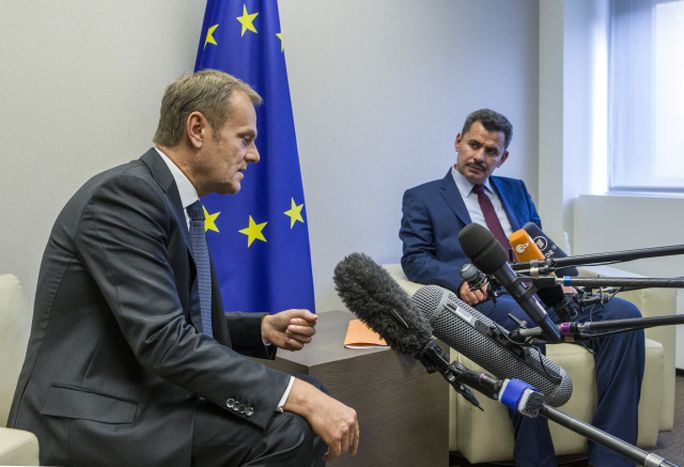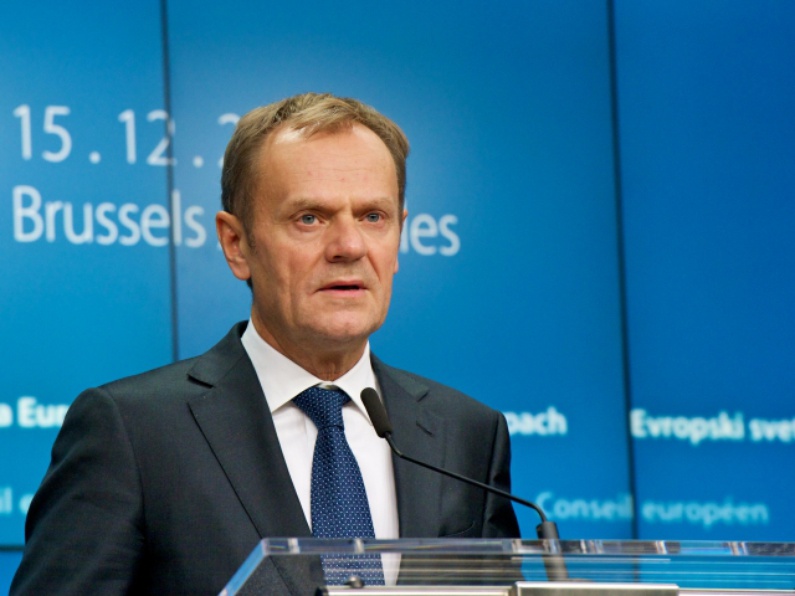
European Council: "History will not forgive", says mayor of eastern Aleppo
Published on
[OPINION] European heads of state and government met today in Brussels in presence of Brita Haj Hassan, mayor of eastern Aleppo. As expected, despite a lot of hearfelt declarations, no concrete decisions were taken.
A cry for help
Today, as the evacuation of civilians began under the protection of the International Committee of the Red Cross (ICRC) in Aleppo, Bachar Al-Assad appeared on a video hailing the fall of the city, calling it a “historic moment”. Historic indeed, says the mayor of eastern Aleppo to the European Council: “History will not forgive. History will remember this international silence in front of the crimes against humanity committed in Syria.”
In Brussels to implore European leaders for help, he declared he had come to “demand justice in the name of humanity, in the name of human rights.” He delivered a very emotional testimony of the current situation in Aleppo. Recalling that “the civilians of eastern Aleppo are only waiting for their death,” he confessed that “the fact that [he is] not able to help them, made [him] cry.”
More words, still no action
Although in today’s meeting, European leaders were to discuss many other topics — such as economy, Brexit and migration — they all expressed upon arrival their concerns towards the situation in Aleppo. “We need to robustly condemn what is happening in Syria,” said Theresa May, UK Prime Minister. All leaders insisted on the first priority, which is “the protection of civilians” according to Federica Mogherini, the EU High Representative for Foreign and Security Policy. French President Hollande stated that EU leaders were aware that “the population cannot take the bombings and massacres anymore”. Although Luxembourg PM Xavier Bettel and President of the European Council Donald Tusk said that they knew Syrians were tired of hearing words without seeing any concrete action on the ground, European leaders were not able to do much more than talk.
“We are not as effective as we would like to be,” admitted Donald Tusk. However, he underlined that the EU and its Member States represent the biggest player in terms of humanitarian relief: "We are behind a lot of the aid that the UN is currently trying to deliver to Aleppo.” EU competences do not allow it to be much more active on this topic, though. Some have nonetheless mentioned the possibility of additional sanctions against Russia, whereas some such as Belgium expressed their concerns that this could mean an escalation of the situation and might not be the best way to ensure the effectiveness of humanitarian relief on the ground. Adopting a much more consensual attitude, European leaders said they would use “all the diplomatic channels” at their disposal to put pressure on the Syrian regime and its Iranian and Russian supports.
Impossibility or unwillingness to act?
This situation is unbearably ordinary — how many times have the EU and the UN declared their will to act, but have not done so?
 European leaders must understand that even though their means are limited, they need to stop complaining about their inability to act. Although it is true that the EU lacks crucial competences in this area, it is also undeniable that all options are not explored: sanctions are barely considered for instance. Moreover, they need to remember that they are the authors of the treaties, and that the EU’s lack of competences are mostly due to their unwillingness to give such competences to the EU. Finally, they need to be more coherent in their policies: they cannot, on the one hand, deplore the unacceptable situation of the civilians in Aleppo, and on the other hand, keep conducting policies that try to prevent people fleeing war zones from getting into Europe.
European leaders must understand that even though their means are limited, they need to stop complaining about their inability to act. Although it is true that the EU lacks crucial competences in this area, it is also undeniable that all options are not explored: sanctions are barely considered for instance. Moreover, they need to remember that they are the authors of the treaties, and that the EU’s lack of competences are mostly due to their unwillingness to give such competences to the EU. Finally, they need to be more coherent in their policies: they cannot, on the one hand, deplore the unacceptable situation of the civilians in Aleppo, and on the other hand, keep conducting policies that try to prevent people fleeing war zones from getting into Europe.
Perhaps it is also time to question our international institutions in light of their complete inefficiency when it comes to situations that are so simple. We are not talking here about finding a viable political solution to the very complex Syrian conflict, we are simply talking about ensuring the effectivity of humanitarian aid in respect of international law. It is time to question the way decisions are taken at the UN — why should so much power be given to so few?
Donald Tusk said he was convinced that no one in Europe is indifferent to the situation in Aleppo. This is true, and should be made clearer. Let’s think about rebuilding our democracies in a way that allows our voices to be heard.



